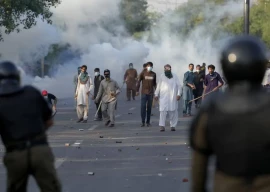
But then, just as the country fell to the wrath of certain elements, Basant became a victim too. While deaths by dangerous string were becoming a problem, the government, rather than tackling this particular issue, simply banned the festival altogether. In the last decade, the ‘origin’ of the festival again became a bone of contention. Some said that since the festival had Hindu connections (with the goddess Saraswati), it could not be celebrated by Muslims. Others linked it to Sikhism and the supposed anti-Muslim nature of the event. Still others, poor liberals, began to argue that, in fact, Basant was a Muslim festival. All, of course, forgot that kites have no religion. Whatever the origin of the festival, if it brings a smile on the face of a person and makes them feel good, then it is certainly a positive thing.
One thing which kept resonating with me after the play was the oft-repeated line that ‘kites breathe in the open air and fly without restriction in the great sky’. Surely, this was not simply a comment on the kites suffocating in the basement of Ustad Manjoo in the play, but also a stark description of our current state of being. Just like the kites, Pakistan is now living a suffocating existence, the movement of most people is restricted — the VIPs do not even want to venture out of their fortresses, the common man is being killed mercilessly on the streets of not only Karachi, but Balochistan, rural Punjab and Khyber-Pakhtunkhwa, and of course, as we know now, people have been dying because of famine in Thar, but no one cared (until the media teams got there, that is). We know what is happening, but we still act as if we do not.
A lot of people roll their eyes when people like me lament the identity confusion in Pakistan. But, in fact, this confusion is really at the root cause of most of our ills. Our commitment to our country, our society, nay to our own selves, cannot be strong unless we know and are comfortable with who/what we are. This is indeed a long and painful process, but unless we undertake it, we will neither know who we are or stand up for what we believe. In the play, Ustad Manjoo was so dedicated to the cause of Basant that he risked being caught and jailed by the police. In fact, in the end, he emphatically tells the policemen that they will have to arrest him again next Basant as he will stand firm and fly kites again. We, both as a society and individually, are still far from displaying the confidence of Ustad Manjoo, and so, I think, till then, the kites must remain in the dungeon, and that there be No Basant.
Published in The Express Tribune, March 12th, 2014.
Like Opinion & Editorial on Facebook, follow @ETOpEd on Twitter to receive all updates on all our daily pieces.
COMMENTS (10)
Comments are moderated and generally will be posted if they are on-topic and not abusive.
For more information, please see our Comments FAQ












































Wonderful thoughts, Professor. I love the subjects you choose and the emotions you express so well. Add to it your inimitable style of writing and the job is complete & well done. Carry on the good work!
@Author
You have penned down my thoughts beautifully. I have never understood when people refuse to celebrate a festival because it is not of their religion. What is the meaning of festival, to celebrate, to enjoy and to take a break from the mundane of life. If you get more chance to celebrate it i dont understand the complaining. Living in India i remember playing with colors and water on holi, eating pua and listening to rang barse at full blast. Waiting eagerly for kheer from my neighbors house on Eid and going over to their homes in the evening to enjoy all the delicious meals. Staying up late on Christmas night at a friends place for a party, exchanging gifts and eating lots of rum and raisin or fruit cakes. Sitting out on a winter evening by the fires of lohri and eating tilkut. Never did i feel it was a festival of "others". It was just....FESTIVAL...a day of celebration with your family, friends, neighbors.
ET - It is as per your comment guidelines, please publish
@Feroz:
Fully agree with you sir
Vikas, Mumbai
@Indian: Are you living in Kabristan or in India ? No one in India will ever ban any festival, unless a violent one is given birth to.
Better people do not know who they are Yaqoob, no want wants to be knowingly disappointed.
Dear Sir,
I am a fan of your writing and read your articles without fail. The evolution of societies and the search for identity is a topic I am keen on. If you do ever come to Bangalore, India, I would really like to meet you.
regards, Rajesh.
Welcome to new Pakistan or Bannistan. In this country if it is a festival something gets ban like mobile service, pillion riding. Other bans are you tube, kite flying etc etc. These things are banned on fatwa of a religious or a political leader on a whim because its the path of least resistance to show I am in charge.
@ BruteForce:
Unfortunate opinion of yet another confused person. Yes Vasanta in Sanskrit means Spring. But, to complete your history lesson; Sufi's and the Muslim community of the Indian Subcontinent have been celebrating Basant since the 13th century.
Our heritage and culture as Pakistanis is associated with the Indian Subcontinent, and the more we try to erase all of that, the more lost we get. Enjoy who you are, and let us have an occasion or two to celebrate. Do not confuse everything with "Hindus do it so we can't".
No one is forcing you to fly a kite, you can sit at home and sulk. I for one, would love to have a healthy activity / outlet in this regressive and utterly depressing country!
@brute force wait for us to impose ban on islamic festivals in india.